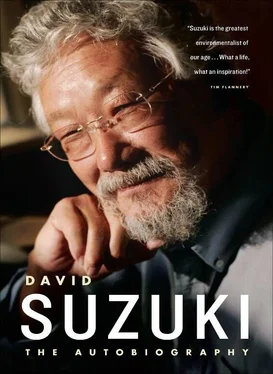Canada's signing was a very significant step but did not deliver the numbers needed to make the protocol internationally binding. The last country that could make that difference was Russia. I don't know what kind of pressure the United States exerted to keep President Vladimir Putin from signing, but I am sure it was considerable. Russia was in a position to blackmail both the Americans, who wanted Kyoto to fail, and the rest of the world, which needed the signature. Although I have no idea what finally tipped the balance, I would be amazed if it was because Putin wanted to do the right thing for the planet. Instead, I suspect he received assurances from the EU that there would be economic benefits to be had by signing. Nevertheless, in an atmosphere of despair and pessimism among environmentalists, Russia ratified Kyoto on November 18, 2004, thereby making the protocol international law ninety days later, on February 16, 2005—seven years after it was completed and a mere five to seven years before its end.
Iraq and Katrina should be wake-up calls to an administration that sometimes behaves like an international renegade, but the Bush — Cheney administration remains focused on its own course and agenda. I have absolutely no doubt that reality — more and more severe weather events, droughts, fires, climbing oil prices — is going to awaken the United States from its slumber on this issue.
I vividly remember the shock of realization that the Soviet Union was advanced in science and engineering in the fall of 1957 when Sputnik was launched. Americans did not cry “we can't do anything about it” or “it's too expensive” as they took on the challenge of the space race. Instead, money, energy, and resources were poured into the effort that not only succeeded in winning spectacularly with the manned lunar landing, but spun off a revolution in telecommunications, astronomy, and space research. And today, Nobel Prizes continue to be awarded to Americans disproportionately because of that commitment to science and engineering.
If we can get this great entrepreneurial nation to devote even a fraction of what is spent on military budgets and homeland security to use energy more efficiently and find energy alternatives, there will be a revitalization of the economy with green initiatives.
SIXTEEN
REFLECTIONS ON SCIENCE AND TECHNOLOGY
TODAY THE MOST powerful force affecting our lives is not politics, business, celebrity, or sports, despite the coverage they receive in the media. By far the greatest factor shaping the world is science as applied by industry, medicine, and the military. We can't go anywhere on the planet without using the products or encountering the debris of science and technology. When I tell children there were no televisions or computers when I was their age, they find it hard to believe and often ask me, “What did you do?” because they can't imagine what one did in such an ancient and bereft civilization.
Each innovation changes the way we do things and renders the old ways obsolete. Looming are even more fantastic technologies, from intelligent machines to cloning, nanotechnology, stem cell regeneration, space travel, and much more. There will also be enormous problems in addition to the ones that already beset us, like global warming, toxic pollution, species extinction, overpopulation, alienation, and drug abuse. Without a basic knowledge of scientific terms and concepts and an understanding of how science differs from other ways of knowing, I don't believe we can find real solutions to such issues. Scientists and educators alike have failed to ensure that scientific literacy is as much a part of what is considered a core value as mathematics, reading, and writing. The consequences of scientific illiteracy among the general public are not trivial.
In the fall of 1987, I was part of a group that examined the degree to which our elected representatives comprehend science. Looking at the thirty-eight Cabinet ministers of the Canadian federal government, we found that of the thirty-two who could be assigned a profession outside politics, twelve were from business, ten from law, three from farming, and two from engineering. Thus, almost 70 percent of those thirty-two were from business or law, perhaps explaining why governments are so preoccupied with economic and jurisdictional issues. Why such a disproportionate representation from those two areas? I think it's because more of the practitioners in these fields can afford or are funded well enough to run for office and risk the enormous costs if they lose.
In a related study in 1987, fifty members of Parliament were administered a very simple test of their comprehension of scientific terms and concepts. Those with backgrounds in business and law scored absolutely rock-bottom. Yet these people will have to make informed decisions about climate change, alternative sources of energy, farmed versus wild salmon, intelligent machines, space research, space missile defence shields, biotechnology, stem cells, cloning, and other issues that require at least a basic grounding in science. No amount of simplification by technical staff will overcome the barrier of scientific illiteracy.
So decisions will end up being made for political reasons. How scientifically literate do we believe U.S. president George W. Bush is apropos of space-based missile defenses, teaching of intelligent design in science courses, foreign aid for HIV/AIDS, or responses to avian flu? Do we believe Australian prime minister John Howard understands the science behind global warming as he opposes the Kyoto Protocol?
Given the degree of scientific illiteracy among politicians, it's not surprising that we can't reach informed, rational decisions on these issues. I have spent a lot of time trying to bring new ministers up to speed when they are appointed, but they get moved around, and we have to start from scratch when a new person is put in the job. Only when scientific literacy is a central part of our education and culture will we have the possibility of a government that can make fully informed political decisions.
IN THE EARLY HISTORY of the human species, the invention of a spear, bow and arrow, needle, pottery vessel, metal implement, and domestication of plants and animals ushered in monumental changes that often reverberated for centuries and transformed individual lives and social arrangements, rendering the old ways extinct. Today multiple technological changes occur at an ever-accelerating rate, thereby ensuring that the world I knew as a boy is no more.
In my childhood, I wasn't permitted to go to movies at all or public swimming pools in the summer because my parents worried that I might catch polio, a viral disease the Sabin and Salk vaccines later pushed into obscurity. Each year around the world, hundreds of thousands of people suffered agonizing deaths or horrible scars from the now-eradicated disease of smallpox. The world I grew up in lacked jet planes, oral contraceptives, heart transplants, transoceanic phone calls, CDs, VCRs, plastics, photocopying machines, genetic engineering, and so much more.
Not only does each innovation alter the way we do things, many may change the very definition of what it is to be human. We love technology because we design it to do specific things for us, but we seldom reflect on the consequences or have any inkling of what the long-term repercussions might be. Thus, we discovered biomagnification of pesticides, the effects of chlorofluorocarbons (CFCS) on the ozone layer, and radioactive fallout from nuclear weapons only after the technologies had been created and used. Consider the impact of the automobile: it liberated us from being local creatures, killed tens of millions of us, facilitated urban sprawl, caused massive loss of land under roads, created global pollution, and accelerated the depletion of resources. Television has had a corrosive effect on communities and social mores and has led to commercials and consumerism and the general dumbing down of issues and thought processes. Technology has huge costs.
Читать дальше


![David Jagusson - Devot & Anal [Hardcore BDSM]](/books/485905/david-jagusson-devot-anal-hardcore-bdsm-thumb.webp)









